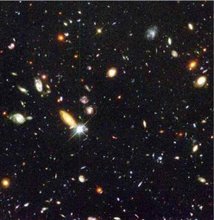Flower in the crannied wall,
I pluck you out of the crannies,
I hold you here, root and all, in my hand,
Little flower—but if I could understand
What you are, root and all, and all in all,
I should know what God and man is.~Alfred, Lord Tennyson
What I don’t know about the universe and what I would like to know about the universe is the same thing: Why does it exist?
To me, why the universe, humans, consciousness, and even I, all exist is the most compelling inquiry. It is also maddeningly the most elusive. But how can we claim to know anything if we don’t even know why we know it? Don’t get me wrong, I’m glad to find out all the answers I can; it’s like putting a billion piece puzzle together. The only problem with the cosmic puzzle is that even if I could put most of the pieces in their respective places during my lifetime, the whole picture would never emerge because of the One Missing Piece: Why.
We've learned a great deal about how our universe exists by measuring and calculating a many number of things, and, to some extent, what exists in our universe through quantifiable observations. The when seems to be accounted for, but then, do we really understand the nature of time well enough to derive a finite number from a possibly infinite set of circumstances?
In commenting on the age of the universe we inevitably find ourselves in a bit of a conundrum because if we say that the universe is about 13.7 billion years old, what we are implying, semantically and literally, is that there was a point in time when the universe was one second old.
This logical lexography gives rise to the Heap paradox and we may ask, “What was going on one second before that second when the universe was one second old, and before that second before that second?” ad infinitum. The real clincher is that if time did not begin until the universe began, then it makes no sense to ask, “What happened before time began?” but this is, nonetheless, precisely what I what I want to ask.
I come to cosmology with the same fascination and reverence I have devoted to the study of botany. Thrilled by the language involved, learning the technical details, and gaining a more meaningful understanding of the world around me, I never tire of hearing the words dark energy or cotyledon.
At the same time, I realize that I can learn all about big bang theory, expanding space, photosynthesis, and how growth comes from meristematic tissue, but will anyone ever know why a flower grows?



No comments:
Post a Comment